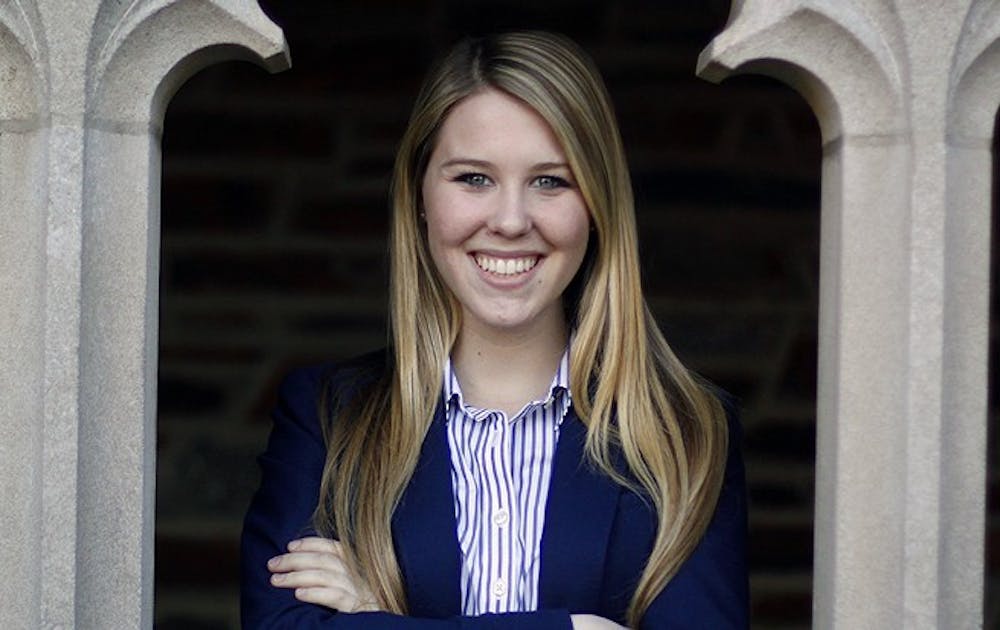Next year’s DSG president, junior Stefani Jones, is already taking steps to address gender issues at Duke.
Jones, currently Duke Student Government vice president for equity and outreach, hopes to prioritize women’s issues at Duke in her term as president. Her goals are based on findings outlined in the 2012 Report on Gender and the Undergraduate Experience published last Spring. In collaboration with other students on a committee dedicated to gender equity, Jones is currently compiling a long-range plan of how students can work with the University to address gender-based inequity.
“What we’ve been doing at the University so far has been kind of a patchwork approach—tackling different issues one at a time,” Jones said. “In order to tackle the problem, you have to tackle the problem as a whole.”
The report—which utilized data from focus groups and existing surveys—analyzed how male and female undergraduates experience Duke differently. For example, they found that women outperform men academically, but they have less confidence in the classroom. The report also suggests ways to support female leadership, prevent and address eating disorders and adopt a comprehensive plan to approach gender-based violence and sexual assault.
The Gender Task Force, which created the report, is composed of 16 faculty, staff and students dedicated to collecting and analyzing data to benchmark Duke’s progress regarding gender since 2003.
Jones, who learned of the report last Fall, said she has made gender a focus of her work and is committed to expanding the University’s focus on gender-based violence and sexual assault.
Specific strategies in the plan include requiring all members of Greek organizations and eventually all students in selective living groups to participate in the Prevent Act Challenge Teach bystander intervention training program, as well as examining student conduct consequences for committing sexual assault. Jones’ committee is composed of approximately 15 students, including both DSG members and non-members.
Jones added that PACT and mandatory reporting of sexual assault are two particularly effective steps that feed into a larger goal of greater gender equality.
Senior Ian Harwood, a Women’s Center gender violence prevention intern, is one of the main collaborators on the University-wide plan. He has contributed research on public health models for addressing gender-based violence. He said he hopes that more administrators commit to addressing sexual violence.
“We aren’t clueless in the world about what to do—there are promising programs and certain things that work better than others,” Harwood said. “That’s the reason for wanting this comprehensive, public health-based approach.”
DSG should act on the recommendations within the report to push for sustained University commitment to retaining female and minority faculty members—especially in science, technology, engineering and math fields, Jones noted.
Jones learned about the gender report last semester when her work to change the policy on the statute of limitations on sexual assault reporting brought her into contact with Ada Gregory, director of the Women’s Center and the report’s author. This is when Jones’ committee first started meeting, and it has since gained momentum.
Jones noted that the task force did not publicize the report’s findings.
Gregory said the recommendations and results laid out in the report have been shared informally with several student and alumni groups, as well as the Board of Trustees, but these groups are “still digesting” information. But students have held several events on campus, bringing to light issues affecting women—including Women’s Housing Option’s WHO Speaks campaign, Eating Disorder Awareness Week and One Sexy Week.
There have been improvements concerning women’s issues at Duke, but there is still room for growth, Gregory wrote in an email Monday.
“All of these efforts bring more discussion and visibility to a range of concerns and provide platforms for taking action and making positive change for the community,” she said.
Although Jones’ DSG committee is an important voice, it is also vital to seek out those who are usually left out of discussions on gender, said Donna Lisker, associate vice provost of undergraduate education and member of the task force.
“What I would most like to see is students taking the lead and demanding a more inclusive, more equitable environment in which to learn and thrive,” added Lisker, also co-director of the Baldwin Scholars program.
Get The Chronicle straight to your inbox
Signup for our weekly newsletter. Cancel at any time.

